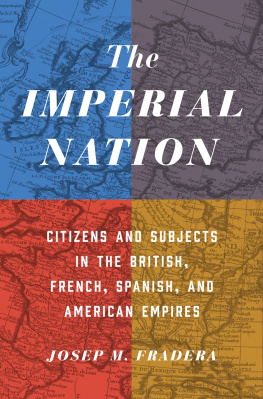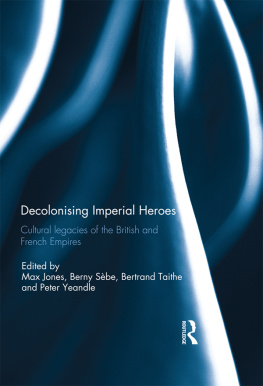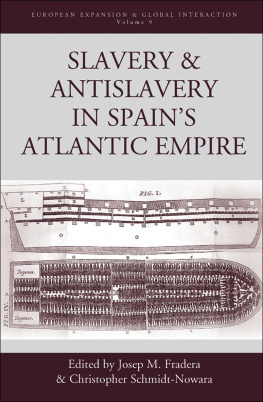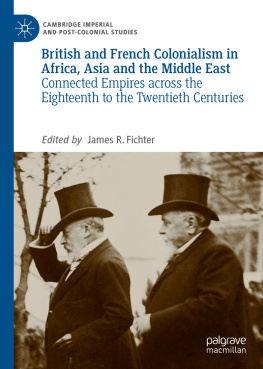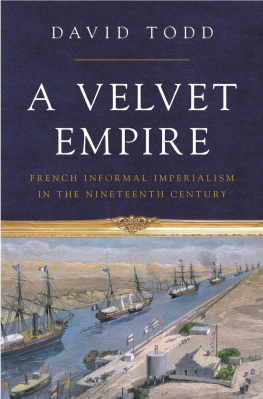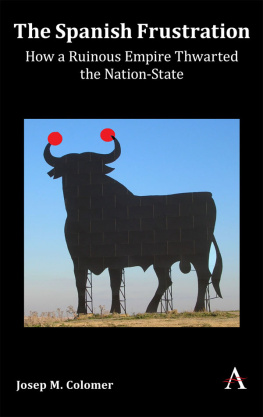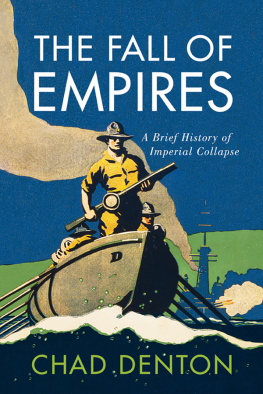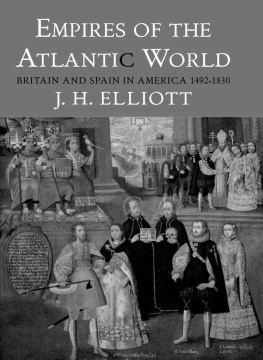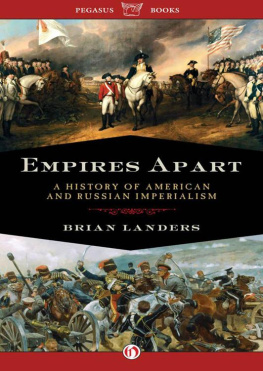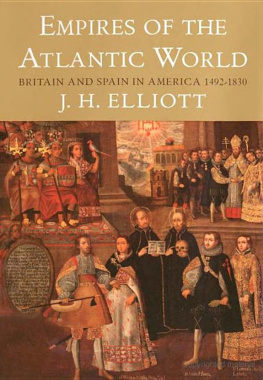THE IMPERIAL NATION
The Imperial Nation
CITIZENS AND SUBJECTS IN THE
BRITISH, FRENCH, SPANISH,
AND AMERICAN EMPIRES

Josep M. Fradera
Translated by Ruth MacKay
PRINCETON UNIVERSITY PRESS
PRINCETON & OXFORD
Copyright 2018 by Princeton University Press
Published by Princeton University Press
41 William Street, Princeton, New Jersey 08540
6 Oxford Street, Woodstock, Oxfordshire OX20 1TR
press.princeton.edu
All Rights Reserved
Library of Congress Control Number: 2018948275
ISBN 978-0-691-18393-0
British Library Cataloging-in-Publication Data is available
Editorial: Amanda Peery
Production Editorial: Kathleen Cioffi
Jacket Design: Amanda Weiss
Jacket Credit: (Top and bottom left) From Carte dEurope, 1769.
(Bottom right) From Carte dAmerique dresse pour lusage du Roy, 1780.
Production: Erin Suydam
Publicity: Jodi Price
Copyeditor: Anne Cherry
This book has been composed in Miller
Printed on acid-free paper.
Printed in the United States of America
10 9 8 7 6 5 4 3 2 1
To my son, Pere
ACKNOWLEDGMENTS
The Imperial Nation: Citizens and Subjects in the British, French, Spanish, and American Empires is an updated and much changed version of La nacin imperial: Derechos, representacin y ciudadana en los imperios de Gran Bretaa, Francia, Espaa y Estados Unidos (17501918), a two-volume book published in 2015 by Editorial Edhasa, in Barcelona. I had spent two decades researching the history of Spain and its empire, and after 2005, when I published Colonias para despus de un imperio (Colonies after Empire), I decided to try to define and conceptualize the Spanish case, both peninsular and American societies, in line with the broader historiographic debate in international terms. Long ago, I was greatly helped in my intentions by the example of two great historians: John H. Elliot and Stanley J. Stein, and also by the inspiring reading of C. A. Baylys Imperial Meridian: The British Empire and the World 17801830, whose book I read before I met him personally. I am also very lucky to share preoccupations and interests with many colleagues and friends. Among them, Jos Mara Portillo, Josep M. Delgado Ribas, Bartolom Clavero, Jess Milln, Albert Garcia Bala, and Juan Francisco Fuentes provided help I cannot measure in the long struggle with the main lines of the book. I would like to mention three more here: Jeremy Adelman (Princeton University); Mauricio Tenorio Trillo (University of Chicago), and Alfred McCoy (University of Wisconsin). Also, I want to express thanks for the comments and suggestions of the lucid and generous external readers of the manuscript. Without the friendship and hard work of Ruth MacKay, my translator, it would have been impossible to finish this book. Also, I would like to thank a young historian, Nria Salls Vilaseca, who checked the possibly overlong bibliography, and the expert copyeditor for Princeton University Press, Anne Cherry. I am very grateful for the support of ICREA (Catalan Institution for Research and Advanced Studies) and of the MINECO-FEDER (HAR 201568183-P) has been. Finally, I would like to acknowledge Brigitta van Rheinbergs warm offer to publish with Princeton University Press.
J.M.F.
Barcelona, April 2018
THE IMPERIAL NATION
Introduction
DURING THE REVOLUTIONARY CYCLE between 1780 and 1830, internal crises and continual conflicts seemed to point to the demise of the great European monarchic empires. A century later, however, the empires were still standing. Two of themthe British and the Frenchgoverned much of the world, a much larger portion than they had ever dominated or held before. With lesser roles, the Spanish and Portuguese, the United States as Britains successor, China, and the Ottoman Turks were also still there, and the recently unified Italy and Germany were trying to join the global race for colonies. In The Imperial Nation, I attempt to decipher the historical keys of this cycle of destruction and reconstruction of empires.
This book is also about a political transformation at the center of the making and unmaking of European empires. It is about how the idea and practice of dual constitutions, or specialness (spcialit in French)the existence and workings of different legislative frameworks for the metropolis and for the coloniesconstituted the backbone of liberal empires political development. My purpose is not to present research on ideologies and principles on their own, but rather, to compare and consider, through local crises and experiences, shared ideas about how to rule empires with specific policies and continual corrections. Looking at historical processes from this point of view is, in my opinion, the only conceptual strategy that allows us to properly understand why the successors of the monarchic empires were always empires, but empires of a different sort. They were empires that did not exclude national developments or phenomena, either at home or abroad, places where even the unfree might feel the call to political participation.
In the beginning of the story are the great imperial crises that led to revolutions in the Thirteen Colonies and in France and which entailed The term man referred to a free individual in a world of slaves and descendants of slaves. This individual was white because he (it was almost always a he) was European or the descendant of Europeans, usually a property owner or settler, and a member of neither a minority Christian sect nor the Twelve Tribes of Israel. We, the People referred to a historically constituted human community with the capacity to proclaim the truth; it did not include those who lived on the margins or even to others within that same community. In this period the ideas of liberty, equality, and representation associated with the universal proclamation of an individual who was born free and should stay freethe ideas that nurtured the Declaration of Independence of the United States (1776) and Frances Declaration of the Rights of Man and of the Citizen (1789), as well as its radical offshoot in 1793spread throughout much of the world. Both in Europe and beyond, the cry for political equality was understood and interpreted literally by many who had not yet been summoned to form part of free humanity, by those who did not qualify to fully join the world the revolutionaries had forged.
This crucial moment was the consequence of deep-seated trends. The prevailing political model among the great empires of the Atlantic world, with the exception of the federal model of the United Provinces, was what H. G. Koenisberger and J. H. Elliott called composite states.Brazil, can doubtless be attributed to many causes, but the most notable, aside from the ideological ferment already mentioned, was the extraordinary fiscal pressure by metropolitan states as a result of these conflicts.
It was in this context that resistance to monarchic dictates in the Thirteen Colonies, Spanish and Portuguese America, and the French Antilles were linked to the demands of the state and the notion of certain rights shared by all subjects, even those who lived far away. The construction of the fiscal-military state, the massive cost of war at sea and in the colonies, and new interest in a truly imperial tax system together articulated a set of problems and conflicts that could no longer remain confined within European borders. The resulting consensus in the face of the demands of monarchic-imperial states was based precisely on the rights held by a kingdoms inhabitants, among which was their ability to share to an important degree in the governance of society. This was how discontent was channeled. Responses were often expressed with words and measures from long ago (old theories of natural right, appeals to contracts between ruler and ruled, celebrations of the rights of free-born Englishmen or Spanish-American subjects of the Castilian crown) which were now projected onto a new context in order to finally produce constitutions with imperial reach and universal value. When these formulations of universal citizenship and equality collapsed once the revolutionary cycle endedthe good news having been spread through

